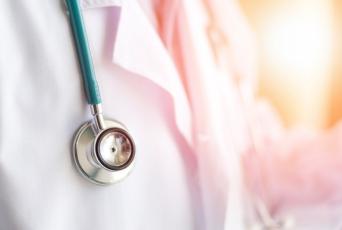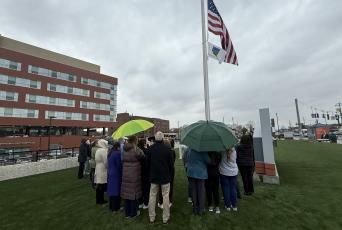
Heart Services & Treatments
Find the best and latest heart surgery treatments from board-certified New York open-heart and bypass surgeons at the UHS Heart Institute. Get the innovative heart care and treatment you’ve come to expect from UHS, the first to bring open-heart surgery to the Greater Binghamton area.
Interventional Cardiology
Interventional Cardiology procedures at UHS involve specifically the catheter-based treatment of heart diseases. Our team of New York cardiothoracic surgeons diagnose and treat conditions such as coronary artery disease, vascular disease and acquired structural heart disease.
Angioplasty
Angioplasty widens a narrowed artery using a tiny tube with an expandable balloon at the end.
Electrophysiology studies (EPS)
Electrophysiology studies (EPS) are tests that help doctors understand the nature of abnormal heart rhythms (arrhythmias).
- Electrophysiology studies test the electrical activity of your heart to find where an arrhythmia (abnormal heartbeat) is coming from.
- These results can help you and your doctor decide whether you need medicine, a pacemaker, an implantable cardioverter defibrillator (ICD), cardiac ablation or surgery.
- These studies take place in a special room called an electrophysiology (EP) lab or catheterization (cath) lab while you are mildly sedated.
Implants
Pacemakers
A pacemaker is a small device that is placed under the skin in your chest to help control your heartbeat. A pacemaker is used to help your heart beat more regularly if you have an irregular heartbeat (arrhythmia)
Implantable Cardioverter Defibrillator (ICD)
ICDs are useful in preventing sudden death in patients with known, sustained ventricular tachycardia or fibrillation. Studies have shown ICDs to have a role in preventing cardiac arrest in high-risk patients who haven't had, but are at risk for, life-threatening ventricular arrhythmias.
Watchman Left Atrial Appendage Device
The "Watchman Left Atrial Appendage Device" is a mesh-like permanent implant that can reduce the risk of stroke in patients with an irregular heartbeat. It is a first-of-its-kind, proven alternative to long-term blood thinner therapy for stroke risk reduction in patients with non-valvular atrial fibrillation. Watchman offers a potentially life-changing stroke risk treatment option that could free patients from the challenges of long-term blood-thinner use.
The implant is available at UHS Wilson Medical Center, home to the UHS Heart & Vascular Institute. The first procedures using the implant were completed in May 2017 by a Watchman team of highly specialized cardiologists: Alon Yarkoni MD and Afzal ur Rehman, MD, Ph.D.
Watchman offers an alternative to the lifelong use of blood thinners for people with the type of atrial fibrillation that is not caused by heart valve problems. It is for patients who cannot take blood thinners due to bleeding issues or who have a lifestyle that puts them at risk for bleeding.
The implant can reduce stroke risk as effectively as warfarin, the most common blood-thinning medication. Unlike warfarin, Watchman can also reduce a patient's long-term risk of bleeding. Most patients no longer have to get regular blood tests and cope with the food-and-drink restrictions that come with warfarin. A total of 92% of patients are able to stop taking warfarin 45 days after a Watchman implant, and 99% are able to stop within a year.
Halting a clot
Atrial fibrillation, sometimes called "AFib," affects the heart’s ability to pump blood properly. This can cause blood to pool in an area of the heart called the left atrial appendage. There, the blood cells can stick together and form a clot. When a blood clot escapes from this area and travels to another part of the body, it can cut off the blood supply to that particular area. When this happens in the brain, it leads to a stroke. Patients with AFib are at five times greater risk of having a stroke because of ineffective blood pumping and stagnation in the left atrial appendage.
In patients with AFib not caused by heart valve problems, more than 90% of stroke-causing clots that come from the heart are formed in the appendage. Watchman is a screen-and-net-like device that is delivered via catheter using a minimally invasive approach. It is designed to permanently block off the appendage and keep the clots that can cause strokes from escaping. Most patients will go home the next day.
Preventing a Stroke Without Medication
Heart patient Leonard Williams was 90 years old and determined to continue doing the things he enjoys, such as caring for his acre of property on his riding lawn tractor. That’s why he chose to undergo a preventive heart procedure that would dramatically decrease his risk of stroke and allow him to stop using blood thinners.
FDA-approved
To date, more than 20,000 Watchman procedures have been performed worldwide. With over 10 years of clinical studies behind it, it has a proven safety record and is the only device of its kind approved for its specific use by the U.S. Food and Drug Administration.
Regional leader
UHS is a regional leader in the diagnosis and treatment of cardiovascular conditions. In addition to the use of Watchman, the Structural Heart & Valve Program of the UHS Heart & Vascular Institute specializes in the most advanced forms of coronary stenting, cardiac ablations, cardiac device implants, aortic valve replacement, closures and ablation for congenital heart defects, and mitral valve repair.
Because of advances available today at UHS, more patients than ever before can benefit from highly specialized heart procedures designed to save lives and enhance the quality of life.
Watchman in 60 seconds
Watch the video below to learn more about AF stroke risk and the WATCHMAN implant procedure.
Ablations
Atrial fibrillation, or AFib, is the most commonly diagnosed heart rhythm abnormality. Complications from AFib can lead to stroke. Patients experiencing the condition can find specialized diagnoses, treatment, and stroke prevention therapies at the UHS Heart & Vascular Institute, located on the campus of UHS Wilson Medical Center in Johnson City.
AFib treatment priorities may include resetting the heart’s rhythm or rate, and lessening the risk of blood clots and stroke. Depending on the patient’s diagnosis and medical history, therapies may include:
- Rate or rhythm control medication – A heart specialist carefully tailors a prescription to a patient’s unique AFib diagnosis while monitoring effectiveness.
- Anticoagulant medication – Blood thinning drugs such as Coumadin® are prescribed to prevent clotting and stroke.
- Ablation procedures – Tiny scars are created on areas of the heart that produce erratic electrical signals with the goal of restoring normal heart rhythm.
- Electrical cardioversion – While under sedation, the patient undergoes a procedure in which an electrical current is delivered to the heart to restore a normal rhythm.
- Left atrial appendage closure using the Watchman device – An appendage of the heart where blood clots collect is sealed off, allowing most patients to discontinue blood-thinning medications.
Should I be checked for AFIB?
Between two and six million Americans live with AFib, including 9% of people over age 65, according to the U.S. Centers for Disease Control and Prevention. AFib can be asymptomatic, but those who do present symptoms may experience one or several of the following:
- Heart palpitations, which may feel like a racing, uncomfortable, irregular heartbeat or a flip-flopping in the chest
- Weakness, fatigue or lack of energy
- Lightheadedness or dizziness
- Confusion
- Shortness of breath
- Chest pain
If you are concerned about possible symptoms of AFib, a primary care physician can perform basic heart function tests to see if referral to a cardiologist is in order.
Heart health questions? Use the UHS Find a Provider tool online to find a doctor near you.
Cardiothoracic Surgery
Our experienced, board-certified New York cardiothoracic surgeons provide the care you need to recover quickly from your illness.
With 30 years of combined experience, we are committed to delivering the best and latest in cardiovascular and thoracic surgery.
Embracing the latest in the field of coronary surgery, most of our coronary bypass operations are now done without the use of the heart-lung machine, with the beating heart.
Based in Johnson City, NY, we serve the greater Binghamton region. Our specialists are experienced in all fields of medicine and our well-trained staff will help keep your stay in the hospital as safe and brief as possible. We make sure that your needs are met in every phase of your cardiovascular care.
Coronary Artery Bypass Grafting (CABG)
A coronary artery bypass graft (CABG) is a surgical treatment for coronary artery disease (CAD), a chronic disease in which there is a hardening and narrowing (atherosclerosis) of the coronary arteries.
During CABG, a surgeon takes a segment of a healthy blood vessel (either an artery or vein) from another part of the body (saphenous vein in the leg or mammary artery in the chest), and uses it to create a detour or bypass around the blocked portion of the coronary artery. As a result, oxygen-rich blood can flow more freely to nourish the heart muscle.
A patient may undergo one, two, three or more bypasses depending on how many coronary arteries (and their main branches) are blocked. Until recently, most bypass surgeries were performed using a heart-lung machine, or now commonly referred to as “on-pump” surgery, when the patient’s heart is stopped during the procedure.
Valve Surgery
- Traditional valve replacement – Substitutes an artificial valve for your malfunctioning or damaged one via open-heart surgery
- Surgical repair - For aortic or mitral valve
Beating Heart Surgery
A ground-breaking technique, which was started at UHS Hospitals in March of 1999, involves stabilizing only that area of the heart on which the surgeon is operating. The entire heart, however, still beats on its own, thus commonly called “beating heart surgery”.
A recent study compared heart patients selected to undergo their bypass surgery either with or without the heart-lung machine. Those who are ''off-pump'' required fewer blood transfusions during surgery; sustained less heart damage; had less weight loss; and had a shorter hospital stay.
Surgical Ablation
Surgical ablation treats irregular heart rhythms (arrhythmia) by blocking the irregular impulses from traveling through your heart.
Dedicated Team of Heart Valve Specialists
Trust the UHS Structural Heart & Valve Center for expert care of heart valve diseases like aortic stenosis or mitral valve regurgitation, conditions affecting the flaps that control how blood flows into and out of your heart.
Choose our knowledgeable team of valve specialists to evaluate your condition and determine a personalized treatment plan that meets your needs. You will benefit from the combined expertise of our cardiologists, surgeons, nurse practitioners and the area’s only doctor fellowship-trained in structural heart disorders—conditions affecting your heart’s chambers or valves.
Together with you and your primary care physician, we will set you on a path to healing that can help you improve your lifestyle and stop additional damage to your heart function.
Heart Valve Conditions We Treat
Choose UHS to treat your structural and valvular heart conditions, including:
- Aortic valve stenosis – Narrowing of your aortic valve that causes your heart to work harder to pump blood throughout your body
- Heart valve disease – Damage to one of the four flaps that regulate blood flow through your heart and body
- Mitral valve regurgitation – Improper closing of the mitral valve that prevents your heart from properly pumping blood out of your heart
- Mitral valve stenosis – Narrowing of your mitral valve that blocks blood flow to the main chamber of your heart
- Pulmonary valve stenosis – A deformity, usually present at birth, on or near your pulmonary heart valve that slows blood flow from the heart to the lungs
Heart Valve Services & Treatments
At UHS, you’ll have access to the latest technology and treatment options for conditions like aortic stenosis and mitral valve regurgitation. In fact, we’re one of the few hospitals in Upstate New York that offers the transcatheter aortic valve replacement (TAVR) procedure for those previously deemed ineligible for a traditional surgical valve replacement.
Help restore proper blood flow to your heart with one of the multiple treatment options, including:
- Medical management – Medications that treat your symptoms and prevent further valve damage
- Balloon valvuloplasty – Widens a narrowed valve using a tiny tube with an expandable balloon at the end
- Transcatheter aortic valve replacement (TAVR) – Minimally invasive procedure that inserts a new aortic valve without open-heart surgery
- Transcatheter mitral valve replacement – Minimally invasive procedure that inserts a new mitral valve without open-heart surgery
- Traditional valve replacement – Substitutes an artificial valve for your malfunctioning or damaged one via open-heart surgery
- Surgical repair - For aortic or mitral valve
Signs of Heart Valve Disease
You may have heart valve disease if you experience any of the following symptoms:
- Shortness of breath
- Chest pain and pressure
- Swelling in your legs
- Fainting, dizziness or lightheadedness
- Heart murmur (as diagnosed by your physician)
-
 Know where to go for your medical concernApril 14, 2025
Know where to go for your medical concernApril 14, 2025It can be tough to distinguish where to go for medical care when your symptoms feel unbearable, and your primary care provider is unavailable. Here are some key differences to help you decide.
-
 Guided by instinct, healed by expertise — orthopedic care close to homeApril 14, 2025
Guided by instinct, healed by expertise — orthopedic care close to homeApril 14, 2025Ever since she was a little girl, Kaylee Goodspeed has been involved in cheerleading. However, as she grew older, she started developing issues with her knees that, if not cared for properly, could have caused problems in the future. With her mother’s advocacy and an expert team of UHS Orthopedic surgeons, Kaylee is now cheering, tumbling and living a normal life once again.
-
 Flag-raising held to commemorate Donate Life MonthApril 10, 2025
Flag-raising held to commemorate Donate Life MonthApril 10, 2025UHS held a flag-raising ceremony at UHS Wilson Medical Center on April 10 to commemorate National Donate Life Month, a celebration of those who have given the gift of life through organ, eye and tissue donation.
-
 Empty Bowls event raises over $8,000 to support hunger reliefApril 10, 2025
Empty Bowls event raises over $8,000 to support hunger reliefApril 10, 2025A huge THANK YOU to everyone who attended the 2025 Empty Bowl Events and showed their support for hunger relief in our area. or every ticket sold, the Food Bank provides 75 meals to the hungry in the Southern Tier!



